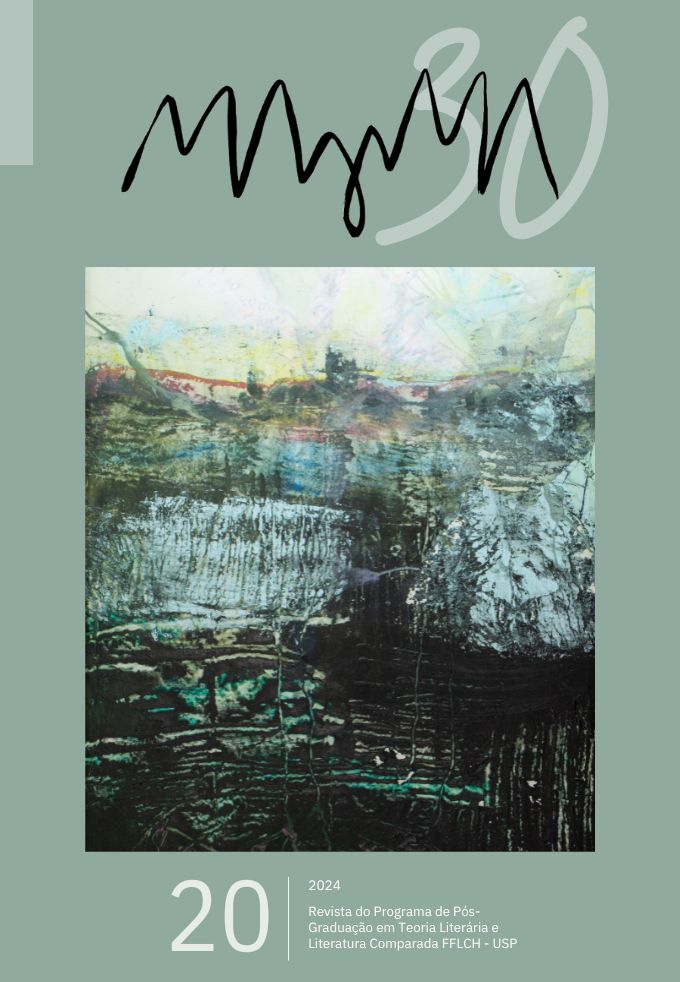Black skin, time machines: Readings on the legacy of slavery and utopias through time travel in Octavia Butler's Kindred and Dawn
DOI:
https://doi.org/10.11606/issn.2448-1769.mag.2024.223555Keywords:
Octavia Butler, Afrofuturism, Afropessimism, Frantz FanonAbstract
While studying the bibliography of the course Afropessimism, Afrofuturism and critical theories of race, taught by Prof. Dr. Marcos Piason Natali, it was possible to identify the multiple sufferings experienced by the black masses in the world in the form of literature, music, poetry and essays. Sometimes, these sufferings are projected into images of another life, imaginary worlds where dreams entangled with nightmares constitute another sociability, marked by complex desires and evil legacies. In the following pages, I investigate what I assume to be Octavia Butler's aesthetic subversion of the types of time travel in the novels Kindred (1979) and Dawn (1987).
Firstly, we will discuss what meanings can be extracted from the comparison between the forms of time travel, the types of displacement (present → past / present → future) and the forms of the machines - when they exist - that make travelling possible. How do Afropessimism and Afrofuturism intersect with the way these journeys take place? Is there a theoretical debate related to the legacies of slavery, as well as strategies for overcoming these legacies, that it is possible to detach from these novels?
Downloads
References
BUTLER, Octavia. Dawn. New York: Warner Books, 1997.
BUTLER, Octavia. Kindred. São Paulo: Morro Branco, 2023.
FREITAS, Kênia; MESSIAS, José. O futuro será negro ou não será: Afrofuturismo versus Afropessimismo - as distopias do presente. In: Imagofagia - Revista de La Asociación Argentina de Estudios de Cine y Audiovisual. Disponível em: https://www.asaeca.org/imagofagia/index.php/imagofagia. Acesso em 21 jan 2024.
HARTMAN, Saidiya. Scenes of subjection, terror, slavery, and self-making in nineteenth-century America. New York: Oxford University Press, 1997.
HARTMAN, Saidiya. Perder a mãe: uma jornada pela rota atlântica da escravidão. Rio de Janeiro: Bazar do tempo, 2021.
MANNE, Kate. Humanism: a critique, in: Social Theory and Practice, Vol. 42, No. 2, Special Issue: Dominating Speech, pp. 389-415.
RACKED E DISPATCHED, Afro-pessimism, an introduction. Minneapolis: Racked e Dispatched, 2017.
FANON, Frantz. A experiência vivida do negro. In: Pele negra, máscaras brancas. Salvador: EDUFBA, 2008.
FERREIRA DA SILVA, Denise. O evento racial ou aquilo que acontece sem o tempo. In: PEDROSA, Adriana; CARNEIRO, Amanda; MESQUITA, André; SANTORO, Artur; MENEZES, Hélio; SCHWARCZ, Lília Moritz; TOLEDO, Tomás. (Orgs.). Histórias Afro-atlânticas: vol. 2. São Paulo: MASP, Instituto Tomie Ohtake, p. 407-411, 2018.
LEVY-HUSSEN, Aida. How to Read African American Literature: Post-Civil Rights Fiction and the Task of Interpretation. Nova York: New York University Press, 2016.
PINHO, Osmundo. Perspectivismo e Afropessimismo. In: Novos Debates, v.7, n.2. Brasília: Associação Brasileira de Antropologia, 2021.
ROWELL, Charles. An Interview with Octavia E. Butler. In: Callaloo, Vol. 20, No. 1, 1997, pp. 47-66. Disponível em: https://www.jstor.org/stable/3299291. Acesso em 21 jan 2024.
CLEMENS, Samuel (ou TWAIN, Mark). A Connecticut Yankee in King Arthur’s Court. Irvine: Saddleback Publishing, 2006.
WELLS, Herbert George. The Time Machine. San Diego: ICON Group International, 2005.
Downloads
Published
Issue
Section
License
Copyright (c) 2024 Leticia de Oliveira

This work is licensed under a Creative Commons Attribution-NonCommercial-NoDerivatives 4.0 International License.
Autores que publicam nesta revista concordam com os seguintes termos:
- Autores mantém os direitos autorais e concedem à revista o direito de primeira publicação, com o trabalho simultaneamente licenciado sob a Licença Creative Commons Attribution CC-BY-NC-ND que permite o compartilhamento do trabalho com reconhecimento da autoria e publicação inicial nesta revista.
- Autores têm autorização para assumir contratos adicionais separadamente, para distribuição não-exclusiva da versão do trabalho publicada nesta revista (ex.: publicar em repositório institucional ou como capítulo de livro), com reconhecimento de autoria e publicação inicial nesta revista.
- Autores têm permissão e são estimulados a publicar e distribuir seu trabalho online (ex.: em repositórios institucionais ou na sua página pessoal) a qualquer ponto antes ou durante o processo editorial, já que isso pode gerar alterações produtivas, bem como aumentar o impacto e a citação do trabalho publicado (Veja O Efeito do Acesso Livre).



